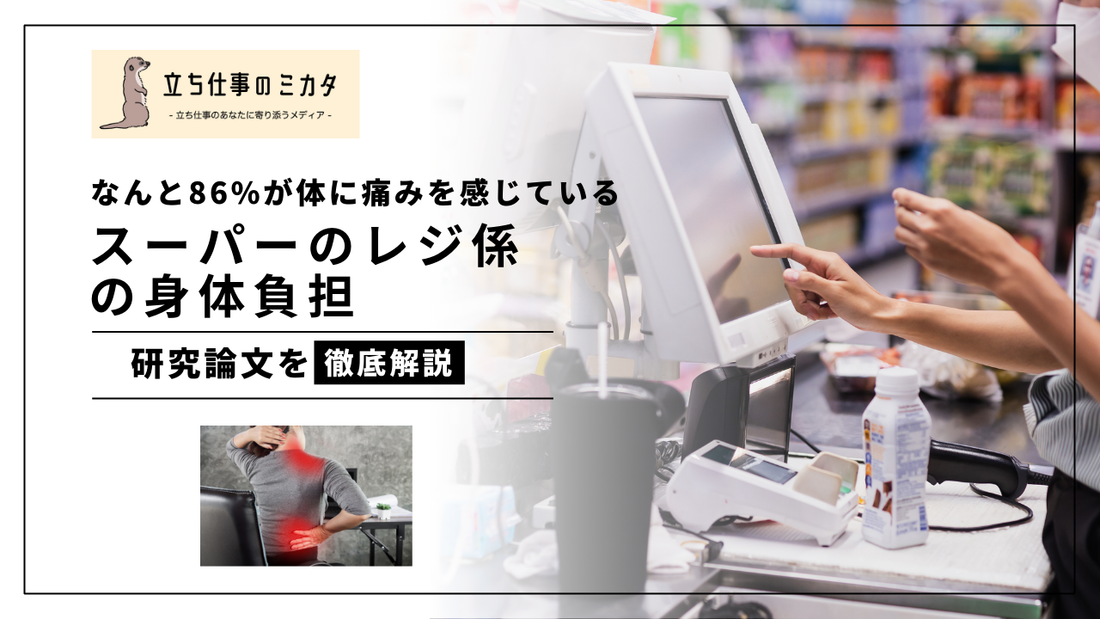
Physical strain on supermarket cashiers: Study reveals 86.6% experience physical pain
Share
Introduction
At first glance, the work of a supermarket cashier may seem to be less physically demanding. However, long periods of sitting and repetitive movements can lead to musculoskeletal symptoms such as lower back pain and neck pain . In this article, we will introduce the contents of a paper published by a research team at the University of Tartu in Estonia, "Musculoskeletal symptoms, and perceived fatigue and work characteristics in supermarket cashiers," and explain the health challenges faced by supermarket cashiers.
Research Methods
This study aimed to investigate the incidence of musculoskeletal symptoms and associated fatigue and job characteristics among supermarket cashiers .
The study participants were 67 female cashiers (average age 33.5 years) who worked an average of 9.7 hours per day. Data were collected in the following ways:
-
Questionnaire survey (Nordic Questionnaire)
- Musculoskeletal symptoms (pain or discomfort) in the past 6 months and the past 7 days
- Psychological factors related to work (fatigue, monotony, busyness)
- Physical activity habits
Research findings
1. 86.6% of cashiers experience musculoskeletal pain
- During the past six months , 86.6% of cashiers had experienced pain or discomfort in at least one area.
- 71.7% of people experienced some type of pain in the past seven days .
2. Location of pain
The most painful areas were:
| Location of pain | Last 6 months (%) | Last 7 days (%) |
|---|---|---|
| Waist | 67.2 | 44.8 |
| neck | 53.7 | 40.3 |
| wrist | 47.8 | 40.3 |
| shoulder | 43.3 | 28.4 |
| knees | 38.8 | 25.4 |
| elbow | 19.4 | 12.0 |
The incidence of lower back (67.2%) and neck (53.7%) pain was particularly high.

3. The reality of fatigue
- 89.6% of cashiers feel physically tired
- 76.1% of cashiers feel mentally fatigued
- 62.7% of cashiers find their work monotonous
- 80.9% of cashiers feel that their work is busy (rushed)
4. Relationship between pain and work characteristics
- Low back pain correlates with neck, shoulder, and knee pain (e.g., correlation coefficient between low back pain and knee pain r = 0.44, p < 0.001).
- However, there is no direct correlation with fatigue or monotony .
5. Benefits of recreational activities
- Approximately 49.3% of cashiers participated in some form of exercise (jogging or aerobics) outside of work.
- Researchers suggest that moderate exercise may help prevent musculoskeletal symptoms .
Observations
The results of this study revealed that supermarket cashiers are particularly susceptible to back and neck strain due to their poor working posture and monotonous work . In addition, the rate of mental fatigue is also high, calling for improvements to the working environment.
Proposed measures
- Incorporating regular stretches and breaks
- Use an ergonomic chair that supports your posture
- Rotation of work movements (reduction of monotonous work)
- Moderate exercise outside of work (jogging and stretching)
summary
It was found that supermarket cashiers are at high risk of developing musculoskeletal problems due to long periods of sitting and repetitive movements. In particular, back pain and neck pain were the most frequently reported, and physical and mental fatigue are also major issues . In the future, improving the work environment and introducing appropriate exercises will play an important role in maintaining the health of workers.

